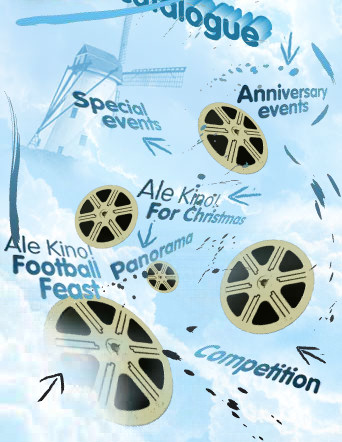
Films from TV Animation Studio
» Eine kleine Nachtmusik. Allegro
» Eine kleine Nachtmusik. Rondo. Allegro from Serenade G major
» Rondo (Alla Turca) from Sonata in A major, KV 331
» The Chinese Tambourine
» The Flight of the Bumblebee
» The Swan from the suite Carnival of the Animals
 |
| The Chinese Tambourine |
If I was given even the best piano in Europe but was told to play for an audience which do not understand what I play do not want to understand it and cannot feel it with me - I would lose my will to play and joy of playing".
Wolfgang Amadeus Mozart
A series of 55 classical music animated films produced in the years 1989-1997 by TV Studio of Animation Films in Poznań being part of the Polish Television is addressed mostly to young audiences and its goal is the popularisation of classical music.
The authors of films selected musical themes on the basis of their personal and often emotional attitude towards particular pieces of music.
The form of an animated film has unlimited possibilities of visual creation and is by its nature “musical" as it influences the imagination of the audience mainly by means of mental shortcuts expressed by movement, graphic art, literary associations and editing. All this makes it possible to create musical film impressions without changing the inner structure of the musical theme.
Music is a subject of those films and its narrator. It creates the rhythm of the picture and the pace of movement; it organises the space in a frame. The co-occurrence of sound and picture makes the viewer equally focused on listening and watching. This undoubtedly works well in pop music videos, which are particularly interesting to young television viewers.
The short films in which outstanding performances of music pieces written by great masters make up the soundtrack, aided by vivid animation, grasp the imagination of young audiences and broaden their musical interests much more effectively than just persuading them to listen to classical music because it is worth it.
The classical music films made in the years 1990-2007 were presented at more than 200 festivals and special shows in Poland and abroad.
In this period, the short musical cartoons received 57 awards and prizes at Polish and international festivals, including 7 prizes awarded by Children’s Juries.
The films were awarded for screenplay, graphic art, direction, animation, “outstanding transposition of music and picture", “innovative form and powerful expression", “best television films", “best music videos for children", “stylistic purity of animated art", “originality of film art" and “outstanding artistic value". They also received a number of very important awards: main prize at Shanghai International Animation Film Festival (The Swan), first prize at Chicago International Children’s Film Festival (Eine Kleine Nachtmusik: Allegro), first prize at the Los Angeles International Children’s Film Festival (Carmen: Toreador Song) and first prize at the International Animated Films Festival in Łódź (Toccata).
The series of classical music animated films has always been a very attractive product of the Polish Television. About 50 contracts have been made to screen the films of this series. The licenses were granted to countries such as Cyprus, Sweden, Mexico, Japan, Spain, the United Kingdom, Switzerland, Korea, Croatia, Slovenia, Hungary, Lithuania, Norway, Finland, Iran, Kuwait, Bosnia and Herzegovina, Russia, China, the USA, Taiwan, Brazil, Portugal, South Africa, Canada, France, Germany and Costa Rica. Korea, China, Japan, Spain, France, Hungary, Sweden, Finland and Taiwan renewed their contracts several times.
The series of classical music animations is the second bestselling production in the history of the Polish Television, just after The Decalogue by Krzysztof Kieślowski.
It is also an exceptional series as regards length of product lifecycle. For most programmes it is four or five years. These short musical animations have been successfully sold since 1991.
Ewa Sobolewska
The Director of TV Animation Studio in Poznań